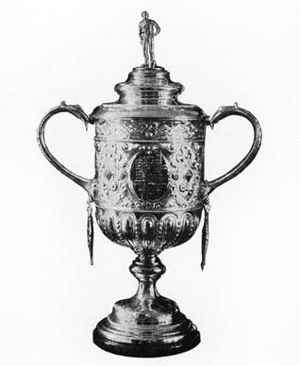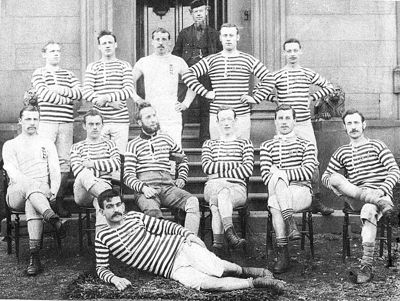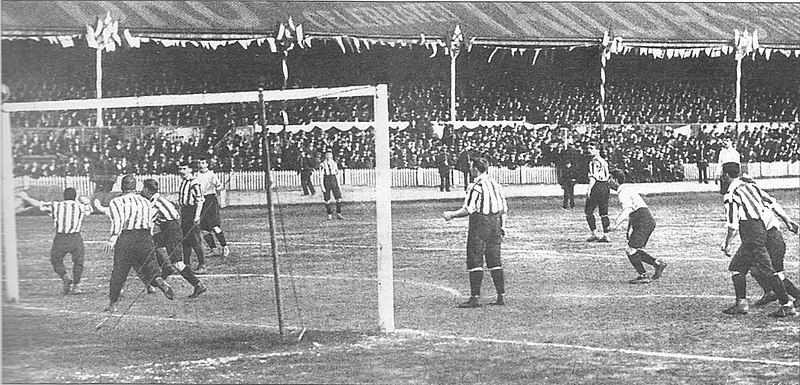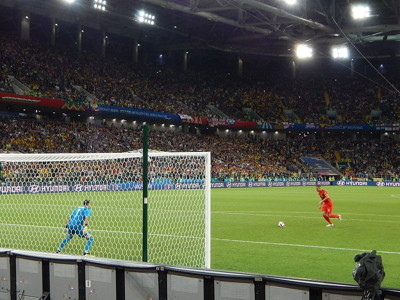 To most modern day football fans the idea of replaying a cup match because a winner wasn’t found seems somewhat anachronistic.
To most modern day football fans the idea of replaying a cup match because a winner wasn’t found seems somewhat anachronistic.
It still happens sometimes, it’s just that when it does it seems strange and more like a burden than a joy at being able to watch more football being played. It is a curiously modern objection, with football of old embracing replays for years.
The FA Cup is the trophy most closely associated with a replay as far as English football is concerned, but it isn’t the only one. The League Cup used replays to decide matches as well, for a time.
When did they stop becoming so common place and why was it that the game chose to generally move on from them? Will they soon be eradicated altogether?
Why Replays Were Invented

It seems strange to think about it now, but there was a time when the likes of extra-time and penalties didn’t exist in football. It wasn’t that they weren’t very popular, they just hand’t been invented. During the game’s more formative years, it would have seemed crazy to have played on for a time to find a winner or to use penalties as a means of deciding a match.
Indeed, when the FA Cup was first a going concern it was almost as if the Football Association hadn’t even considered what should happen if a game ended in a draw. That’s exactly what happened in the 1st round match between Hitchin FC and Crystal Palace on the 11th of November in 1871, so the FA simply allowed both clubs to proceed to the 2nd round.
The issue of what should happen in the event of a draw soon became a problem for the Football Association. A 2nd round match between Barnes and Hampstead Heathens finished 1-1, but rather than both clubs progressing to what would have been the quarter-finals, they chose to have a replay themselves and the Heathens won it 1-0. This wasn’t FA policy, however.
Crystal Palace drew again in the quarter-finals, this time against The Wanderers, with the two clubs ignoring what Barnes and Hampstead Heathens had done and instead progressed to the semi-finals. It was at the semi-final stage that the Football Association realised it was going to have to come up with a solution, thanks to the fact that both matches ended in a draw.
Obviously a situation in which all four teams made it into the final couldn’t happen, so replays of both games were arranged. That was simple enough to arrange for Royal Engineers and Crystal Palace, but Queen’s Park had travelled from Glasgow to play their match against The Wanderers, so they chose to withdraw from the competition rather than have to travel again for a replay.
The very fact that the FA had been put in a situation where it didn’t have a clear ruling forced the organisation’s hand for future iterations of the FA Cup. The result was that it was made a rule that if a match ended in a draw then it would be replayed. If that also ended in a draw then a third match would take place, with this situation repeating until a winner was found.
No Home Advantage
 The reasoning behind the Football Association’s decision to introduce replays was simple enough: the club that drew playing away from home would get to take the other team back to their ground and thereby remove the notion of home advantage. If a third game was needed then which of the two teams’ grounds would be used for it would be decided according to a coin toss.
The reasoning behind the Football Association’s decision to introduce replays was simple enough: the club that drew playing away from home would get to take the other team back to their ground and thereby remove the notion of home advantage. If a third game was needed then which of the two teams’ grounds would be used for it would be decided according to a coin toss.
Somewhat ironically, there was no need to have a replay for the second iteration of the FA Cup. It was the only time that the competition was played out in the manner that had originally been conceived for it, as a challenge cup. That meant that the previous year’s winner got a bye to the final and the other teams ‘challenged’ each other for the right to play in it.
The following year the ruling was needed when Sheffield FC and Shropshire Wanderers drew their 1st round match, but when the replay also ended in a goalless draw the club chose to skip a second replay and instead decide which club would progress by the toss of a coin. This was the only time in FA Cup history that that method of deciding something was used.
The notion of having a replay was played out at the highest level of the game when Royal Engineers, who had required a replay against Oxford University to make it through the semi-final, drew the final against Old Etonians. The result was the first ever final that required a replay, with twelve more being used for the showpiece match before they were abandoned for it.
Replays Change Football

One of the most famous examples of a replay in the FA Cup occurred during the 1878-1879 season when the Old Etonians and Darwen went up against each other in the quarter-finals. It is famous because it ultimately changed the way that the competition worked for a time. Darwen travelled to The Oval and clawed a 5-1 scoreline back to 5-5 in the first match.
The replay was also played at The Oval and ended 2-2 after extra-time had been played. When the side needed to travel to The Oval for the second replay and third time in total, the fact that they were an amateur side and had had to fund their travel to London repeatedly came up in conversation. The result was that a decision was taken to regionalise the early rounds of the FA Cup moving forward.
From then on only the semi-finals and final was played at The Oval, so teams like Darwen didn’t have to spend huge amounts of money and time in order to take part in the football matches that they were playing. An example of that was seen in 1886 when Blackburn Rovers and West Bromwich Albion drew the FA Cup final, with the replay seeing the showpiece event move out of London for the first time.
Replays Became Too Numerous

In the 1891-1892 season, Nottingham Forest played West Bromwich Albion in the FA Cup semi-final. The first match was played at Molyneux and ended in a draw, with a decision taken to also play the replay at the home of Wolverhampton Wanderers. That also ended 1-1, so the second replay was moved to Derby’s Racecourse ground. That ended 6-2 to the Baggies, but was the first example of a semi-final needing three matches to determine the result.
It wasn’t long before competition organisers began to wonder if they needed some sort of alternative to a replay at some point. This really came to a head when Arsenal played Gillingham in the 3rd qualifying round of the FA Cup in 1899-1900. It took four replays and five matches in total to decide upon a winner, with all of the games being played in a space of 17 days. Gillingham, who were known as New Brompton at the time, eventually won.
The need for four replays was a rare occurrence, which might help to explain that nothing was added to the Football Association’s rules to say that only a limited number of re-matches would be allowed. So it was that nearly 80 years later Arsenal were once again involved in a titanic battle to progress in England’s most famous cup competition.
This time it was Sheffield Wednesday that they were up against and they needed another four replays to get past the Owls, despite the fact that the Yorkshire club were in the third tier of English football at the time. Nine hours of football and three different venues were required to settle the match, with the Gunners eventually going on to lift the trophy that season.
The Introduction Of Penalties
 It is perhaps no surprise that it was Arsenal that were involved in the match that saw the end of multiple FA Cup replays. It happened in the 1990-1991 season when they were playing Leeds United in the 4th round. The two clubs couldn’t decide upon a winner over three matches before the Gunners eventually won in the fourth game of the competition.
It is perhaps no surprise that it was Arsenal that were involved in the match that saw the end of multiple FA Cup replays. It happened in the 1990-1991 season when they were playing Leeds United in the 4th round. The two clubs couldn’t decide upon a winner over three matches before the Gunners eventually won in the fourth game of the competition.
It didn’t help that Merseyside rivals Liverpool and Everton needed two replays in the 5th round to decide which club should progress, meaning that the FA really felt that something needed to be done to stop that sort of thing from happening. So it was that it was decided that a penalty shoot-out would be used to decide the winner if no result was there at the end of the first replay.
Bizarrely, the penalty shoot-out was only introduced for the ‘proper’ rounds of the FA Cup and multiple replays were still needed for the qualifying rounds. It took seven more seasons before penalties were introduced there, whilst the FA Cup final had replays removed from it in the wake of the 1993 final that involved Sheffield Wednesday and, who else, Arsenal.
Semi-final replays were scrapped for the 1999-2000 iteration of the competition, with Arsenal, amazingly, being involved in the last ever semi-final replay when they eventually lost to Manchester United. Quarter-finals had replays removed for the 2016-2017 season, then 5th round replays were scrapped ahead of the 2018-2019 campaign.
The League Cup

The English Football League Cup, which has enjoyed countless different names over the years because of sponsorship, has always done its best to differentiate itself from the FA Cup. It is seen as the ‘Mickey Mouse cup’ by many football fans, feeling that the fact that it’s limited to Football League clubs means that it’s less prestigious than the FA Cup.
In fact, there are more than a few clubs that view the competition as an unwelcome distraction from more important tournaments such as the Premier League and the Champions League. Even so, the cup’s organisers clung on to the idea of having replays for as long as necessary, only scraping multiple replays officially ahead of the 1993-1994 iteration of the competition.
A decision was taken to scrap extra-time in League Cup matches from the 2018-2019 season. Instead, matches that were being drawn at the end of the ninety minutes would progress straight to penalties. The hope was that this would make the competition more exciting and reduce the ever-growing calls for it to be scrapped in its entirety.
What Is The Future For Cup Replays?
 There has long been a call to get rid of replays altogether in the FA Cup proper. The general feeling is that football clubs play far too many games anyway and the idea of having to replay a game when we know full-well that extra-time and penalties exist just makes the competition seem like a throw-back to a bygone era.
There has long been a call to get rid of replays altogether in the FA Cup proper. The general feeling is that football clubs play far too many games anyway and the idea of having to replay a game when we know full-well that extra-time and penalties exist just makes the competition seem like a throw-back to a bygone era.
The Football Association is generally made up of stubborn old crones, though, so it’s entirely possible that replays will remain at some stage of the competition for some years yet. The problem is that by refusing to scrap them for the 3rd round onwards, the FA is forcing clubs involved in numerous competitions to play weakened sides and that doesn’t help the tournament’s prestige.
If we do indeed get to the stage of replays being scrapped in every round of the FA Cup, how long will it be before a club is able to lift the trophy without having scored a goal in normal time? It’s entirely plausible that a side could draw every match 0-0, fail to score in stoppage time and progress through every round courtesy of a penalty shoot-out.
The simple truth is that football has moved on immeasurably from when it was first invented. Nowadays footballers are finely tuned athletes, training day-in, day-out to make sure that their bodies are able to withstand the rigours and challenges of the modern game. Asking them to replay matches when a penalty shoot-out would be a much easier method of deciding a result just seems old hat.
It is unlikely to be long before every competition that sides take part in will have scrapped replays and will instead look to extra-time and penalties to decide upon the outcome. It is not only fairer on the players but will likely prove to make the tournaments more interesting if viewers know that a match must be decided on the day or night.
